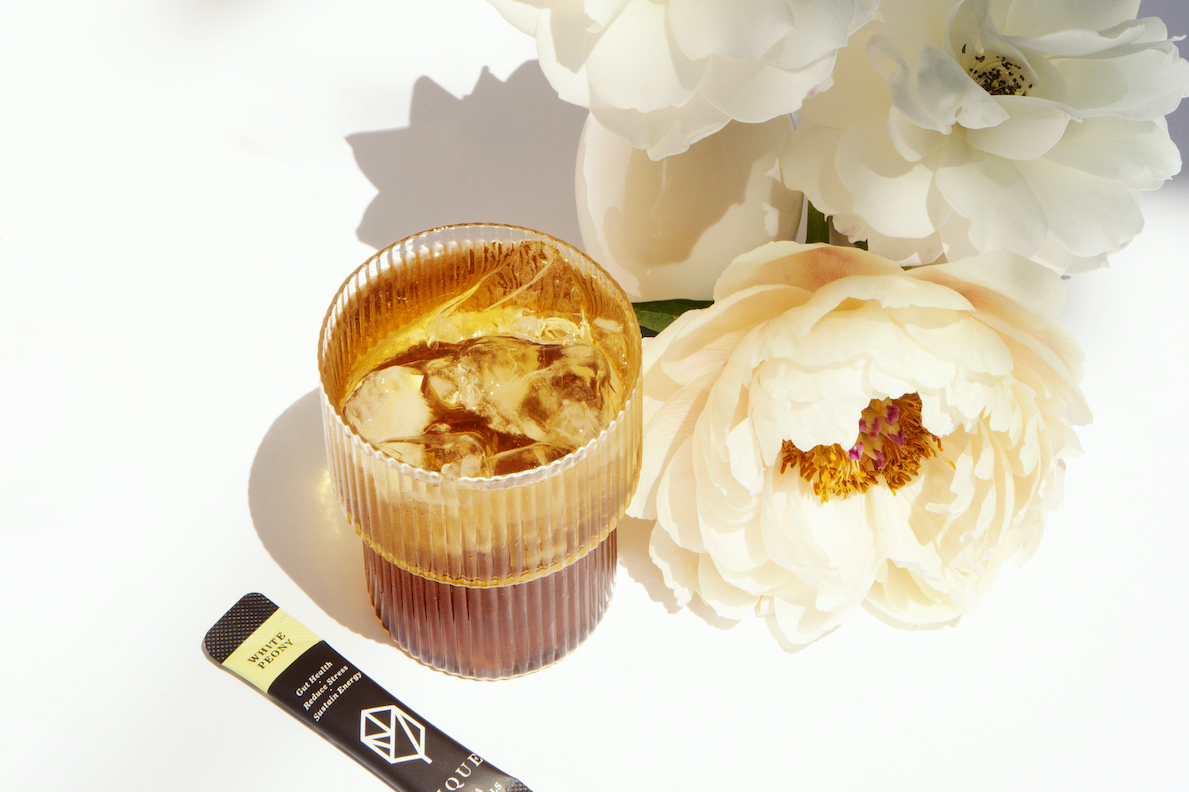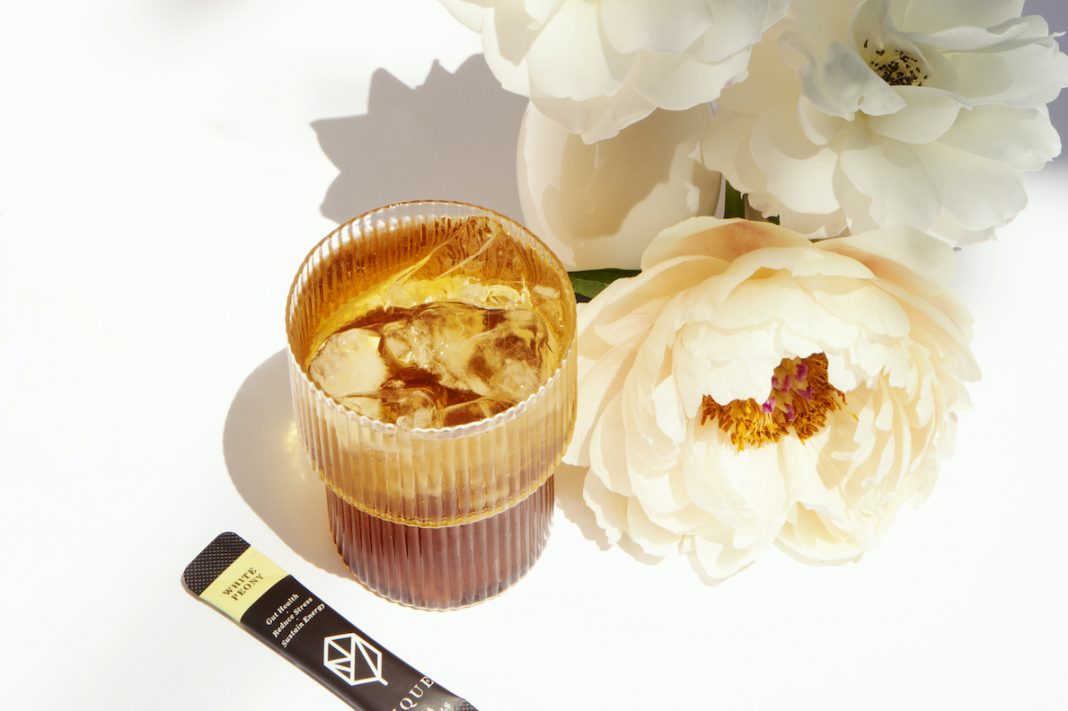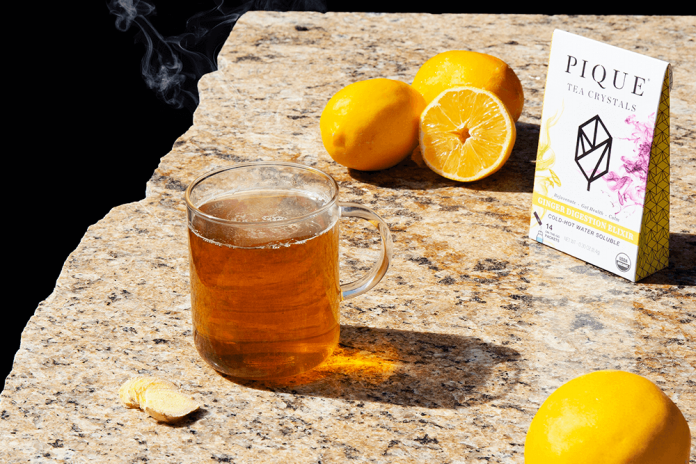When you don’t feel well, curling up on the couch with a good book and some hot tea or soup can be immensely soothing.
A cup of tea is certainly comforting and beneficial when you’re sick, but some evidence suggests that along with other healthy habits, daily tea-drinking before you’re ill could be a helpful way to stay ahead of the curve.
Rather than wait until you experience symptoms to take action, perhaps being proactive and taking care of your immune system on a regular basis is the wiser strategy.
In this article, we’ll discuss how tea can support a healthy immune system, the top 5 teas to drink for immunity and 5 herbal teas that are also backed by promising evidence for immune support.
How Does Tea Support Healthy Immune Function?
According to scientific research, true teas from the Camellia sinensis plant can support your immune system in a variety of different ways.
First of all, polyphenol antioxidants in tea support cellular health, which may be helpful in supporting healthy immune function (1).
EGCG, a catechin that occurs in all true teas but is most concentrated in white, green, and fermented Pu’er teas, supports the balanced function of both the innate and adaptive immune systems. (2)(3)
Black tea contains beneficial immune-supporting compounds, too. Theaflavins and thearubigins, which are created in black tea during the oxidation process, help support the body’s ability to protect cells during infections, as well as help support the body’s ability to slow the progression of infections. (4)
And according to an in vitro cell model study published in the journal International Immunopharmacology, “Green and black tea extracts displayed similar immunomodulatory properties” due to their antioxidant effects. (5)
A 2015 study also concluded that green tea can help support an environment that’s hostile to harmful microbes, which may help support your immune system when your body is exposed to bacteria. (6)
Last but not least, l-theanine, the amino acid found in tea, also supports healthy immune function–at least in part by supporting a calm, balanced response to stress, which some researchers think helps support a healthy immune system. (7)
How Other Cultures and Traditions View Tea and Immune Health
Generally speaking, Asian cultures–particularly China and Japan–have a much longer history with tea than Western cultures. For example, sources indicate that the medicinal use of tea in China dates back at least as far as the 3rd century B.C.
And along with millennia-old traditions come respect and reverence for the health benefits of tea. For example, according to a traditional Chinese saying, it is “better to be deprived of food for three days, than tea for one.”
Traditional Chinese herbalists tout the ability of green tea to relax the body, clear heat and toxins, and boost immune function. But even moreso, traditional Chinese medicine holds that drinking green tea every day is an effective strategy for preventing disease, including infection.
And in Japan, green tea is the go-to tonic any time someone’s feeling under the weather. Some Japanese people also gargle with salted tea when they think they’re getting a cold.
However, Camellia sinensis-derived teas aren’t the only teas that enjoy a long traditional history. The 5,000-year-old Ayurvedic tradition from India commends the immune-supporting properties of herbal teas with diverse ingredients including ginger, turmeric, peppermint, hibiscus, lemongrass, licorice, chamomile, and tulsi or holy basil (more on herbal teas shortly).
The 5 Best Teas for Immune Support
1. White Tea
Due to its minimal processing, high-quality white tea often contains the highest catechin amounts of all true teas, and catechins are the best-studied polyphenol antioxidants. (8)
According to a 2018 paper published in the journal BioMed Research International, catechins like EGCG (epigallocatechin gallate) are gaining scientific acclaim for their ability to support the body’s ability to prevent infections, as well as support the immune system’s ability to battle infections when they do occur. (9)
Additionally, the polyphenols in white or green tea can act as prebiotics. (10) As a result, tea-drinking may support a healthy gut microbiome, which in turn helps support healthy immune function. (11)
And white tea also contains high levels of l-theanine, a calming amino acids that some researchers think helps support a healthy immune system (12)(7).
All in all, white tea is an excellent preventive tea to drink daily to support a healthy, balanced immune system.
2. Fermented Green Pu’er
A moment ago, we mentioned that because it’s minimally processed, white tea typically contains the highest levels of immune-supporting catechins of all true teas.
However, research also shows that catechin content varies tremendously from one tea sample to another. Check out the following study findings from the Journal of Food Science (8):
- White tea total catechin content ranged from 14.4 to 369.6 milligrams per gram of dried tea
- Green tea total catechin content ranged from 21.38-228.8 mg/g
In other words, depending on the tea supplier, total catechin content could range ten- to twentyfold! And there’s no way to know without testing that specific source of tea, which is the primary reason to stick with trusted, high-quality suppliers.
But it just so happens that at Pique Tea, we’ve found that a very special fermented green Pu’er variety is significantly higher in catechins than any other tea. (We’ve taken to calling it a Supertea for that reason.)
And because Pu’er is fermented in a unique process, it’s also probiotic, meaning it contributes healthy bacteria to directly your gut and helps support a healthy microbiome. (13)
If you want to support healthy immune function and support your body’s natural ability to fend off illness, fermented green Pu’er certainly packs a potent punch.
Here’s our favorite pu’er green tea:
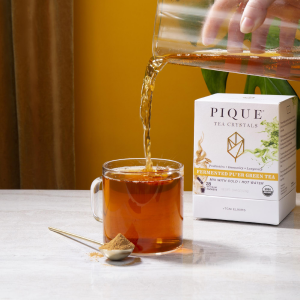
Pique Pu’er Green Tea
Unrivaled polyphenol concentration. The ultimate supertea for immune support and cellular health.
3. Black Tea
Black tea is oxidized longer than green tea or even oolong tea–in fact, it’s fully oxidized. The oxidation after harvest is responsible for the bold color, taste, and flavor of black tea.
Because of how it’s processed and aged, black tea contains fewer catechins like EGCG compared to green tea, but contains other compounds with potential health benefits. (14)
Namely, black tea is high in flavonoids called theaflavins and thearubigins that possess unique properties. Their molecular structure is larger and heavier than tea catechins, resulting in different physiological effects (15).
A six-month-long randomized controlled trial found that daily black tea consumption supported normal immune function in healthy people, and may support natural immune rebalancing in people with inflammatory conditions. (16)
Research also suggests that healthy black tea flavonoids help support a healthy, diverse gut microbiome through prebiotic action, but perhaps differently from catechins. (17)
For best results, try drinking a daily combination of black tea and green tea to achieve maximum prebiotic gut support.
4. Chaga
The chaga mushroom (Inonotus obliquus) is a fungus that grows on Birch trees throughout the Northern hemisphere.
Although it’s not a true tea, the use of tea made from chaga to promote health may go all the way back to Roman times or earlier. Plenty of cultures regard chaga tea as medicinal today, too.
And as is often the case with traditional remedies, modern scientific research is confirming some of the historic uses of chaga.
Specifically, studies suggest that chaga could help support a healthy anti-inflammatory state in your body, as well as support healthy activity of immune cells. (18)
And similar to the prebiotic benefits of true tea, chaga may support a healthy gut flora population by feeding beneficial bacteria in your gastrointestinal tract. (19)
5. Reishi
The reishi mushroom (Ganoderma lucidum) mainly occurs in humid Asian climates, where it’s been a fixture in Eastern traditional medicinal systems for centuries.
In traditional Chinese medicine, a tea made from reishi is indicated for cough, shortness of breath, weakness, or times of stress.
And modern evidence suggests reishi tea may help support an anti-inflammatory state, support innate immunity, and support your body’s natural defense against allergies. (20)(21)(22)
Top 5 Herbal Teas for Immune Support
If you’re looking for something extra to complement the potent health benefits of true teas, here are our top herbal tea picks for immune support:
1. Ginger tea is an Ayurvedic staple traditionally used to aid digestion and decrease inflammation. Research suggests it supports healthy immune function and cellular health. (23)
2. Turmeric, often added to ginger tea, is said by Ayurvedic practitioners to assist with circulation, the liver, and healthy joints. New research confirms turmeric can support cellular health, support your body’s natural anti-inflammatory response, and support your immune cells. (24)(25)
Here’s our recommendation for turmeric tea:
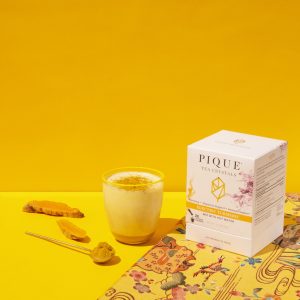
Pique Electric Turmeric
Invigorate your cells with Okinawa’s best-kept longevity secret. Delight your palate, sunup to sundown, with a masterful blend of Ayurvedic superplants.
3. Peppermint tea is best-known as a stomach soother, but studies point to possible immune support benefits, too. (26)
4. Hibiscus tea may help support balanced immune function and support the immune system’s natural response against pathogens throughout the body. (27)
5. Tulsi (Holy Basil) tea is an incredibly important tonic in Ayurveda, where it’s used to support general health. And five clinical trials indicate tulsi may support healthy immune function or support the body’s natural antiviral capabilities, too. (28)
Most herbal teas aren’t quite as well-backed by research as true teas, but they’re still a fantastic choice when you need a soothing, caffeine-free alternative.
Final Thoughts
At Pique Tea, we prefer polyphenol-rich teas over antioxidant supplements for immune support and general health benefits.
In addition to the refreshing and enjoyable nature of tea-drinking, teas are also a delicious way to obtain health-promoting flavonoids.
And in contrast to synthetic or lab-extracted antioxidants, teas naturally contain a diverse range of beneficial compounds–which is one reason why they’ve survived for millennia as a staple health practice.
The occasional bout of illness may be unavoidable, but adopting smart, sustainable lifestyle habits–doing something simple and natural every day, like drinking tea–could mean you’re less likely to be caught off guard by sudden threats.
